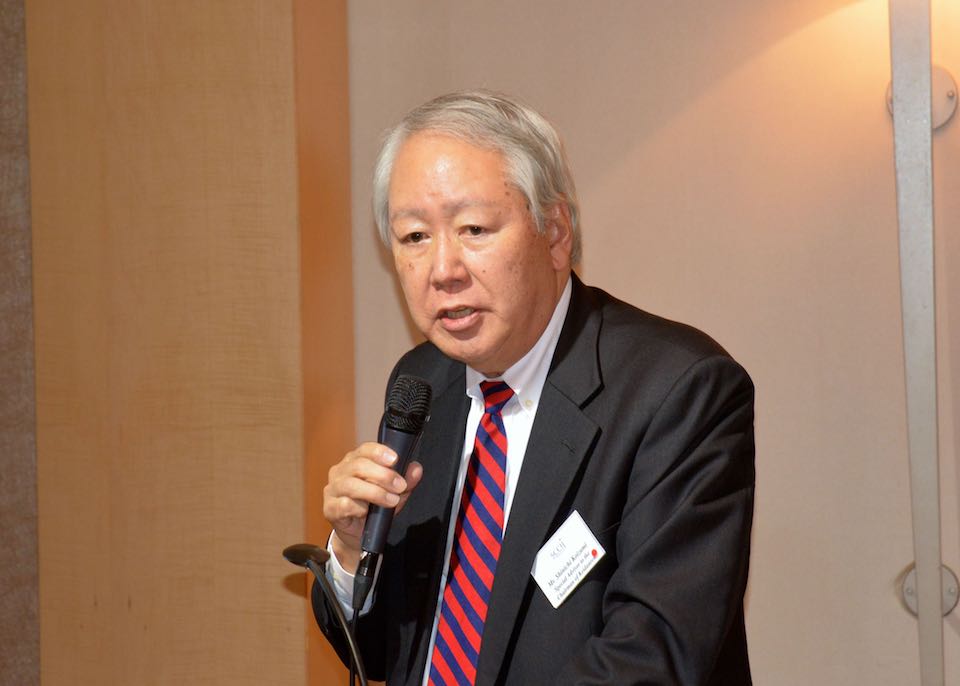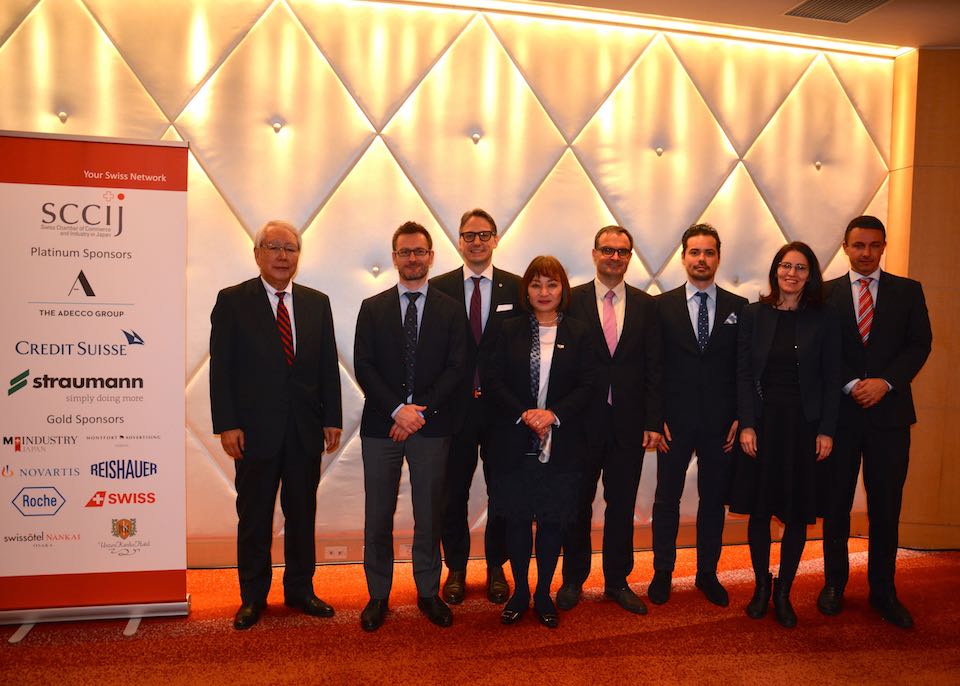Tokyo (SCCIJ) – The future concepts of Industry 4.0 and Society 5.0 will reshape the economic, social and cultural context in which we live but may have serious negative side effects without real global collaboration, Mr. Shinichi Koizumi, Special Advisor to the Chairman of Keidanren, argued at the December luncheon attended by more than 40 members and guests of the SCCIJ. Industry, government and academia across the globe should cooperatively and sincerely explore necessary action programs corresponding to disruptive changes of the new digital era so that we can establish a stable, sustainable and inclusive development of our society, the speaker demanded.
Low growth, rising inequality
Mr. Koizumi started his talk by describing the current situation of advanced economies: Annual growth rates have halved to 2 percent; labor and capital input do not considerably rise anymore. Only productivity growth would contribute, but this rate has also declined in the 21st century. Another feature would be rising inequality: More than 90 percent of profits of major blue chip listed companies in the US would go as dividend and stock repurchases to shareholders and to the salaries of chief executives. Based upon a recent Oxfam report, the world’s eight richest people own the same amount of wealth as the lower half of humanity with 3.6 billion people. The famous “elephant curve” of Branko Milanovic shows a booming global elite and a simultaneous decline of the middle class income in the developed world.
Additionally, the global agenda would be complicated by a challenged liberal democracy, environmental disruption and uncertainty of global security, the luncheon speaker continued. “Populists try to absorb the frustrations of people by showing wrong but simple and easy solutions”, he argued. The results of this anti-liberal democracy, anti-globalism sentiment and “my country first” attitude would be strong objections to the existing and future global common including multilateral free trade agreements.

SCCIJ December Luncheon speaker Mr. Shinichi Koizumi, Special Advisor to Keidanren
4th industrial revolution emerging
“We need innovative ideas to tackle fundamental problems and to stabilize the society,” Mr. Koizumi demanded. The emerging 4th industrial revolution may be the answer to these challenges: Its development and spread would be based on the widespread use of internet, drastic cost reduction of sensors, the rapid evolution of artificial intelligence allowing high-speed data analysis and ICT global platform building through standardization and common specification. “This allows us to construct smart factories which are inter-connected in both virtual space and physical space,” the speaker said.
He identified cyber-physical space interconnections for manufacturing, autonomous driving, e-commerce/sharing services and healthcare as probable areas for the 4th industrial revolution. Mr. Koizumi mentioned the project of “Virtual Singapore” to demonstrate light and shadow of the future world: On the one hand, by utilizing all data about people in the city of the future, their lives could be significantly improved. On the other hand, the system might take total control over their lives. “You may feel good or bad because of this control”, Koizumi said. Another side effect would be the spread of so-called gig workers having multiple tasks without social security.
Japan wants Society 5.0
“Japan focuses on the creation of safe and secured ‘smart society’ in both cyber and physical space, which would contribute to the solution of environment, energy and other challenges of the global agenda”, the speaker argued. He referred to the proposals of Keidanren (Japan Business Association) about the development of Society 5.0. (The Keidanren paper can be downloaded from here.) The core idea of Society 5.0 would be to take a more human-centered approach, the speaker said. “We believe that Society 5.0 needs continuous reforms due to falling population, super-aging society, natural disasters, possible terrorism and environmental problems”, Mr. Koizumi said.
The speaker also revealed his own thinking about these challenges. “Japan is strong in physical hardware but needs many software skills”, Mr. Koizumi said. Thus, Japan would need to consider drastic changes of its education programs both in quantity and quality to acquire more software skills. “Japan is good at incremental innovation but not good at disruptive innovation,” he warned. Also, Japanese would like technological innovation efforts but tend to avoid social innovation. “The bedrock regulation is one of the most difficult barriers to achieve social innovation in our country”, the speaker stated.

Members and advisors of SCCIJ executive committee with luncheon speaker Shinichi Koizumi
Side effects of 4th industrial revolution
By 2025, more than 1 trillion sensors will be installed and 80 percent of the global population will be online. But this revolution may have negative side effects, Mr. Koizumi warned. Some of the existing business models may be wiped out, and there may be mismatches in the labor market and available skills, and possibly a widening gap between haves and have-nots. The hurdles for the creation of common international standards and regulations would be very high. Other challenges would be the vulnerability of cybersystems for hacker attacks and an inappropriate use of personal big data. Mr. Koizumi also mentioned a possible exponential development of artificial intelligence which might even lead to the extinction of the human race, and stressed upon the necessity of the establishment of a global ethical standard.
The speaker contrasted this rather dark vision with some suggestions about how to reap benefits from the next industrial revolution. First, he pleaded for more in-depth collaboration among industry, government and academia by breaking through hidden walls. Second, he demanded a drastic reform of existing regulation and legal frameworks. Facilitation of entrepreneurship and financial support for small and medium enterprises for solid value chain creation would be needed. Education and training systems should also correspond to the 4th industrial revolution era. Only a global network could guarantee cybersecurity.
Keeping social peace
“Also, a social consensus at all levels through fair and transparent assessment is necessary to keep social peace”, the speaker said. This would mean, among other things, a fair distribution of expected income to secure a more positive future outlook of the middle classes. “We have to change the mindset of middle-class families that they can see a positive future for their children”, the speaker argued. This would also require a reform of liberal democracy and the avoidance of populism.
During the Q&A part of the luncheon, the speaker voiced his opinion about Japan’s global perspective. “We have to change our mindset and should be more open for collaboration”, Mr. Koizumi said. In the past, Japanese companies tended to keep their proprietary technology within the company. But in the future, some parts of this know-how should be shared and used to create common platforms. “This way, Japan could eventually improve its productivity much more”, Mr. Koizumi predicted. As a second point, he demanded the end of the silo thinking in Japan. “We have to remove hidden walls and open Japan up to the world”, the speaker said frankly.
Biography
Mr. Shinichi Koizumi was born in Tokyo, Japan, in 1948. He received a Bachelor’s degree in Economics from Keio University in 1971.
Professional Career:
1971/04 Joined Toray Industries, Inc
2004/06 Vice President (Member of the Board)
2006/06 Senior Vice President (Member of the Board)
2007/06 Senior Vice President (Member of the Board & Member of the Executive Committee)
2008/06 Executive Vice President & Representative Member of the Board
2013/06 Senior Advisor, Toray Industries, Inc.
Chairman of the Board, Toray Corporate Business Research, Inc.
2014/06 Special Advisor to the Chairman of KEIDANREN (*)
2015/06 Senior Advisor, Toray Industries, Inc.
Member of the Board, Obayashi Corporation (*)
2016/06 Managing Director, Japan Bank for International Cooperation (*)
2017/06 Standing Auditor, DeNA Co., Ltd. (*)
(*) = current position
Text and photos: Martin Fritz for SCCIJ





























